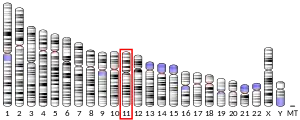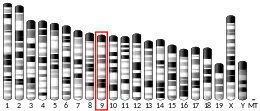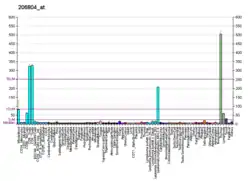CD3G
T-cell surface glycoprotein CD3 gamma chain is a protein that in humans is encoded by the CD3G gene.
T cell antigen receptor (TCR) is associated on the T cell surface with a complex of protein called CD3. CD3G (gamma chain) is one of the four peptides (gamma, delta, epsilon and zeta) that form CD3. Defects in CD3G are associated with T cell immunodeficiency.[5]
References
- GRCh38: Ensembl release 89: ENSG00000160654 - Ensembl, May 2017
- GRCm38: Ensembl release 89: ENSMUSG00000002033 - Ensembl, May 2017
- "Human PubMed Reference:". National Center for Biotechnology Information, U.S. National Library of Medicine.
- "Mouse PubMed Reference:". National Center for Biotechnology Information, U.S. National Library of Medicine.
- "Entrez Gene: CD3G CD3g molecule, gamma (CD3-TCR complex)".
Further reading
- Joseph AM, Kumar M, Mitra D (2005). "Nef: "necessary and enforcing factor" in HIV infection". Curr. HIV Res. 3 (1): 87–94. doi:10.2174/1570162052773013. PMID 15638726.
- Li CJ (2007). "Therapeutic biology: checkpoint pathway activation therapy, HIV Tat, and transkingdom RNA interference". J. Cell. Physiol. 209 (3): 695–700. doi:10.1002/jcp.20817. PMID 17001685. S2CID 37846031.
- Luzzati AL, Giacomini E, Giordani L, et al. (1992). "The antigen-specific induction of normal human lymphocytes in vitro is down-regulated by a conserved HIV p24 epitope". Immunol. Lett. 33 (3): 307–14. doi:10.1016/0165-2478(92)90078-3. PMID 1385321.
- Lanier LL, Chang C, Spits H, Phillips JH (1992). "Expression of cytoplasmic CD3 epsilon proteins in activated human adult natural killer (NK) cells and CD3 gamma, delta, epsilon complexes in fetal NK cells. Implications for the relationship of NK and T lymphocytes". J. Immunol. 149 (6): 1876–80. PMID 1387664.
- Letourneur F, Klausner RD (1992). "A novel di-leucine motif and a tyrosine-based motif independently mediate lysosomal targeting and endocytosis of CD3 chains". Cell. 69 (7): 1143–57. doi:10.1016/0092-8674(92)90636-Q. PMID 1535555. S2CID 32641759.
- Arnaiz-Villena A, Timon M, Corell A, et al. (1992). "Brief report: primary immunodeficiency caused by mutations in the gene encoding the CD3-gamma subunit of the T-lymphocyte receptor". N. Engl. J. Med. 327 (8): 529–33. doi:10.1056/NEJM199208203270805. PMID 1635567.
- Arnaiz-Villena A, Perez-Aciego P, Ballestin C, et al. (1991). "Biochemical basis of a novel T lymphocyte receptor immunodeficiency by immunohistochemistry. A possible CD3 gamma abnormality". Lab. Invest. 64 (5): 675–81. PMID 1709425.
- Alarcón B, Ley SC, Sánchez-Madrid F, et al. (1991). "The CD3-gamma and CD3-delta subunits of the T cell antigen receptor can be expressed within distinct functional TCR/CD3 complexes". EMBO J. 10 (4): 903–12. doi:10.1002/j.1460-2075.1991.tb08023.x. PMC 452733. PMID 1826255.
- Ruegg CL, Strand M (1991). "A synthetic peptide with sequence identity to the transmembrane protein GP41 of HIV-1 inhibits distinct lymphocyte activation pathways dependent on protein kinase C and intracellular calcium influx". Cell. Immunol. 137 (1): 1–13. doi:10.1016/0008-8749(91)90051-C. PMID 1832084.
- Cefai D, Debre P, Kaczorek M, et al. (1991). "Human immunodeficiency virus-1 glycoproteins gp120 and gp160 specifically inhibit the CD3/T cell-antigen receptor phosphoinositide transduction pathway". J. Clin. Invest. 86 (6): 2117–24. doi:10.1172/JCI114950. PMC 329852. PMID 1979339.
- Luzzati AL, Pugliese O, Giacomini E, et al. (1990). "Immunoregulatory effect of a synthetic peptide corresponding to a region of protein p24 of HIV". Folia Biol. (Praha). 36 (1): 71–7. PMID 2111780.
- Koning F, Maloy WL, Coligan JE (1990). "The implications of subunit interactions for the structure of the T cell receptor-CD3 complex". Eur. J. Immunol. 20 (2): 299–305. doi:10.1002/eji.1830200211. PMID 2138083. S2CID 2180901.
- Ruegg CL, Strand M (1990). "Inhibition of protein kinase C and anti-CD3-induced Ca2+ influx in Jurkat T cells by a synthetic peptide with sequence identity to HIV-1 gp41". J. Immunol. 144 (10): 3928–35. PMID 2139676.
- Alexander D, Goris J, Marais R, et al. (1989). "Dephosphorylation of the human T lymphocyte CD3 antigen". Eur. J. Biochem. 181 (1): 55–65. doi:10.1111/j.1432-1033.1989.tb14693.x. PMID 2540970.
- Griesinger F, Greenberg JM, Kersey JH (1989). "T cell receptor gamma and delta rearrangements in hematologic malignancies. Relationship to lymphoid differentiation". J. Clin. Invest. 84 (2): 506–16. doi:10.1172/JCI114193. PMC 548910. PMID 2547833.
- Tunnacliffe A, Buluwela L, Rabbitts TH (1988). "Physical linkage of three CD3 genes on human chromosome 11". EMBO J. 6 (10): 2953–7. doi:10.1002/j.1460-2075.1987.tb02600.x. PMC 553731. PMID 2826124.
- Krissansen GW, Owen MJ, Verbi W, Crumpton MJ (1986). "Primary structure of the T3 gamma subunit of the T3/T cell antigen receptor complex deduced from cDNA sequences: evolution of the T3 gamma and delta subunits". EMBO J. 5 (8): 1799–808. doi:10.1002/j.1460-2075.1986.tb04429.x. PMC 1167043. PMID 2944745.
- Davies AA, Cantrell DA, Hexham JM, et al. (1987). "The human T3 gamma chain is phosphorylated at serine 126 in response to T lymphocyte activation". J. Biol. Chem. 262 (23): 10918–21. doi:10.1016/S0021-9258(18)60903-2. PMID 3112151.
- Gold DP, Clevers H, Alarcon B, et al. (1987). "Evolutionary relationship between the T3 chains of the T-cell receptor complex and the immunoglobulin supergene family". Proc. Natl. Acad. Sci. U.S.A. 84 (21): 7649–53. Bibcode:1987PNAS...84.7649G. doi:10.1073/pnas.84.21.7649. PMC 299357. PMID 3478717.
- Oravecz T, Norcross MA (1994). "Costimulatory properties of the human CD4 molecule: enhancement of CD3-induced T cell activation by human immunodeficiency virus type 1 through viral envelope glycoprotein gp120". AIDS Res. Hum. Retroviruses. 9 (10): 945–55. doi:10.1089/aid.1993.9.945. PMID 7506554.
External links
- Human CD3G genome location and CD3G gene details page in the UCSC Genome Browser.
- Overview of all the structural information available in the PDB for UniProt: P09693 (T-cell surface glycoprotein CD3 gamma chain) at the PDBe-KB.
This article incorporates text from the United States National Library of Medicine, which is in the public domain.
This article is issued from Wikipedia. The text is licensed under Creative Commons - Attribution - Sharealike. Additional terms may apply for the media files.




